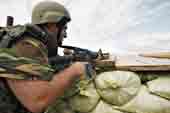South Ossetia on edge of war
By Temuri Kiguradze and Winston Featherly
Friday, August 8

Tensions have only escalated in breakaway South Ossetia after severe violence last weekend, and show no sign of abating. The streets of the secessionist capital are reportedly abandoned and Tbilisi says the South Ossetian separatist leader has fled.
In an address to the nation yesterday evening, Georgian President Mikheil Saakashvili said he ordered a unilateral ceasefire.
“A few hours ago I gave an order—a very painful order for a commander-in-chief to give—that not a single Georgian unit, neither a police nor other unit under our control should return fire to end the very intense bombardment.”
“We must stop this spiral of violence.”
Interfax reported that Russian officials have succeeded in arranging emergency talks between Georgian and separatist officials for tomorrow. Talks scheduled for yesterday were derailed, ostensibly over a disagreement on what format the negotiations would be in.
As of last night the violence was continuing, and Georgian officials denied reports that the South Ossetians had agreed to a ceasefire.
Violence grew throughout week
The confrontation sparked last weekend after the fiercest fighting in years left six dead. The conflict zone fell briefly quiet after that, but growing clashes have pushed the situation to the edge over the last several days.
Both sides reported heavy shootouts overnight Wednesday that continued into the day. By yesterday evening, the South Ossetians counted two dead and 18 wounded. Reports put the number of Georgian dead at ten, with 50 wounded.
Tbilisi says the separatists launched an attack yesterday on the Georgian-controlled villages of Nuli and Avnevi in a bid to take strategic heights overlooking the area. A Georgian armored personnel carrier was destroyed in the attacks, confirmed Interior Ministry spokesman Shota Utiashvili, wounding three Georgian troops.
“Heavy shootings continue,” he told the Messenger yesterday.
The South Ossetian separatist press committee said Georgian forces attacked an Ossetian-controlled village and were pushed back from strategic hills.
Late in the evening Utiashvili said that South Ossetian fighters continued to attack despite the Georgian ceasefire.
The Georgian-controlled village of Prisi reportedly came under attack late last night. Separatists had claimed the day before there were Georgian artillery attacks from the heights above Prisi. Tamarasheni, a Georgian town a stone’s throw from Tskhinvali, also came under fire last night, according to the Georgian Interior Ministry.
Accusations of preparing for war
Tbilisi accuses the separatists of starting the violence. A Georgian Foreign Ministry statement yesterday said the separatists’ attacks are made “with the purpose of inciting large-scale confrontation and thwarting direct dialogue.”
An earlier statement pointed to South Ossetian announcements of arriving volunteer fighters from the North Caucasus as further evidence they are gearing up for war.
Separatist officials accuse Georgia of amassing armored vehicles and infantry near the edge of the conflict zone, and say they have evacuated women and children from Tskhinvali. They also claim Grad missile systems are set up by the Georgian town of Gori, south of the conflict zone.
Eyewitnesses in the area said they saw large Georgian military convoys headed toward for the region.
Utiashvili, the Interior Ministry spokesman, denied the deployment of missile systems but confirmed a “rotation of military forces near Gori.”
A Russian peacekeeper officer in South Ossetia told reporters yesterday that their forces recorded eight flyovers of Georgian warplanes and surveillance drones in the previous 24 hours.
Yesterday’s Georgian Foreign Ministry statement said Moscow shoulders much of the blame for the violence.
“The only way that separatists manage to maintain their grip on power is through military, human and technical resources provided to them by the Russian Federation,” the statement read.
“The recent developments have shown clearly that the position of the Russian Federation will be the decisive factor in how the process will unfold in the Tskhinvali region.”
Russia’s deputy foreign minister said the remarks were “unfair” and that Moscow is trying to mediate in the crisis to prevent more bloodshed.
The Georgian president’s speech, delivered after the Foreign Ministry statement was released, changed the tone on Russia’s responsibility for the clashes: “The leaders of the [Russian] peacekeeping force told us a few hours ago they have completely lost control over the separatists’ actions… We are in constant contact with the Russian Foreign Ministry’s leadership. The Russian Foreign Ministry is trying—they say they are trying, but not succeeding—to get the separatists to cease fire.”
Georgia is Russia’s “natural ally,” said Saakashvili.
Tbilisi urges talks after negotiations fail
Georgia’s top official for conflict issues, Temur Iakobashvili, told reporters that hoped-for talks fell through after he traveled to the conflict zone yesterday, where South Ossetian representatives refused to meet him.
“Tskhinvali looked empty, as I know [separatist leader Eduard] Kokoity has left the town,” Iakobashvili said, adding that Russia’s own envoy was not able to reach Tskhinvali due to car troubles.
Asked whether Georgian army troops could be sent into South Ossetia, Iakobashvili said: “We are doing everything to resolve the tense situation by peaceful means. However, we’re always ready to protect our citizens wherever they are.”
Earlier in the week Tbilisi announced that direct talks were scheduled, but South Ossetian officials later said they would not participate, insisting that any negotiations must be within the Joint Control Commission format which includes Russian, North Ossetian, South Ossetian and Georgian representatives.
Georgia says the Joint Control Commission is unbalanced and declared last year it would no longer take part in its meetings.
Saakashvili last night called for direct talks in “any kind of format.” He also reiterated offers of wide autonomy for South Ossetia within Georgia, which he said Russia could oversee.
Deep international concern
The OSCE, EU and UN all weighed in yesterday with statements of concern over the violence, calling for an immediate halt and direct negotiations.
Reuters reported that senior US State Department official Daniel Fried and the deputy Russian foreign minister had spoken and agreed to cooperate on keeping the violence from growing.
